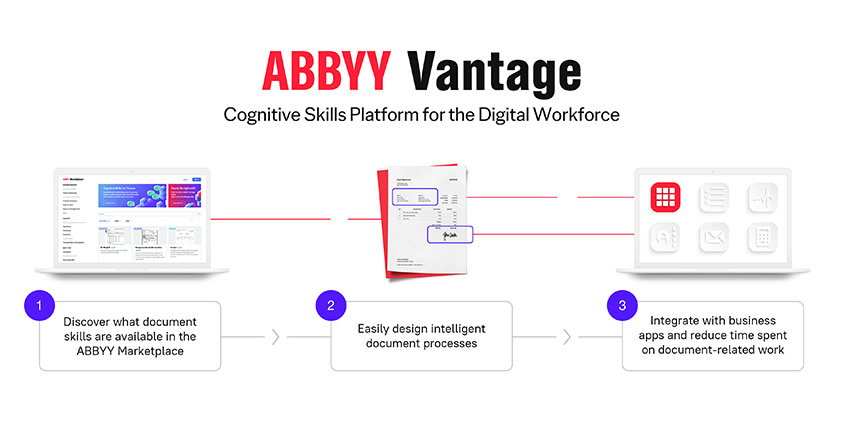Vantage 3.0
Introducing a hybrid approach to using Document AI and GenAI
Supercharge AI automation with the power of reliable, accurate OCR
Increase straight-through document processing with data-driven insights
Integrate reliable Document AI in your automation workflows with just a few lines of code
PROCESS UNDERSTANDING
PROCESS OPTIMIZATION
Purpose-built AI for limitless automation.
Kick-start your automation with pre-trained AI extraction models.
Meet our contributors, explore assets, and more.
BY INDUSTRY
BY BUSINESS PROCESS
BY TECHNOLOGY
Build
Integrate advanced text recognition capabilities into your applications and workflows via API.
AI-ready document data for context grounded GenAI output with RAG.
Explore purpose-built AI for Intelligent Automation.
Grow
Connect with peers and experienced OCR, IDP, and AI professionals.
A distinguished title awarded to developers who demonstrate exceptional expertise in ABBYY AI.
Explore
Insights
Implementation
January 05, 2022

The most newsworthy topic lately has been on the supply chain disruptions—shortages specifically. Every consumer and business now experiences supply chain disruption in the form of shortages and rapid inflation. Scarcity directly drives up the cost of goods, and Transportation and Logistics play a key role in this conversation. While many shortages come from interruption of production, COVID being the most notable cause, the issue is compounded by hard-coded document-dependent processes that don’t adapt quickly enough to onboard new suppliers or tackle changes in shipping requirements.
Agility in document processing matters now more than ever to shippers as a vital link in the supply chain. Eighty percent of business processes are document-driven, which can be the weakest link in a supply chain. Yet, many shippers don’t know where to begin this automation journey in a way that gets the quickest wins.
Most shippers have some experience with traditional automation approaches–most notably robotic process automation (RPA) with basic optical character recognition (OCR) technologies. These tools have enabled automation of rote tasks and rote document data extraction and validation in stable processes. But, change has become a fact of shipping operations in today’s normal of supply chain disruption, and traditional OCR solutions are no longer enough. They focus only on data field recognition, extraction, and validation, and accomplish this most often through hard-coded instructions from applications and IT systems.
Adding artificial intelligence (AI) with machine learning (ML) has added sophistication to OCR to make it more “intelligent” in handling variance, but most of the solutions available on the market today are limited by their data field-level processing.
Named entity recognition (NER) offers maximum flexibility in managing the high variability and change in documents that often breaks automation of document processing applications. NER, being focused on the quality of information regarding business entities (shipper, customer, for example), gains higher rates of straight-through processing than field-level recognition because it does not care about the location coordinates or metadata tagging of specific fields.
Shipping documents are highly variable, and modern NER approaches take that variability and change as a given and build more reliable automation on top of it.

Low-code / no-code solutions take NER flexibility even further by removing the burden of having to lay down a complex application infrastructure for IT to implement and maintain. Pre-trained low-code / no-code “document skills” (pre-built readings of known document types–bills of lading, for example) can be plugged into existing applications and be up and running in hours or minutes versus their traditional OCR counterparts.
Since many shippers do not have the IT budget to add yet another big system application, low-code / no-code IDP solutions can be implemented directly by your operations group, on the front line where agility is most needed.
What if shippers could have ready-made solutions for these critical documents–solutions with a deep understanding of both the operational processes the documents enable and an understanding of these documents as highly variable, constantly changing entities?

These Intelligent Document Processing solutions are now available with ABBYY Vantage. With a low-code / no-code library of pre-built freight and shipping documents, Vantage empowers shippers and logistics providers of any size to meet their most difficult document processing challenges using their operational knowledge, instead of a major IT investment.
Available now in the ABBYY Vantage Marketplace are the essential document skills shippers need, including:
Vantage pre-built containerized document skills for Transportation & Logistics deliver the adaptability, straight-through processing automation, and lowest-cost solutions needed to respond to ever tighter SLAs in a world where supply chain disruptions have become normal business. Now, automation is in reach of shippers with the most constrained budgets.
We have a skill for that.
Real-time visibility and document processing are the key to supply chain digital transformation. That is precisely the idea behind the new ABBYY Marketplace, the first digital marketplace for processing and understanding enterprise documents that provides a rich collection of content skills, connectors, and assets. Many of the top shippers and logistics providers, and many cloud-based companies, are providing their business users and citizen developers the best-in-class document and content processing with our easy-to-use, configurable, and pluggable platform, which is ready to use within minutes.
Learn more about how ABBYY is helping Transportation and Logistics providers in supply chains become more nimble through the power of low-code / no-code in ABBYY Vantage and Marketplace — preloaded with skills developed by ABBYY and by our partners to automate all types of content-centric processes. With over 30 years of making document processing work for enterprises, ABBYY puts that experience to work in Vantage as the most complete and modern solution to Intelligent Document Processing.